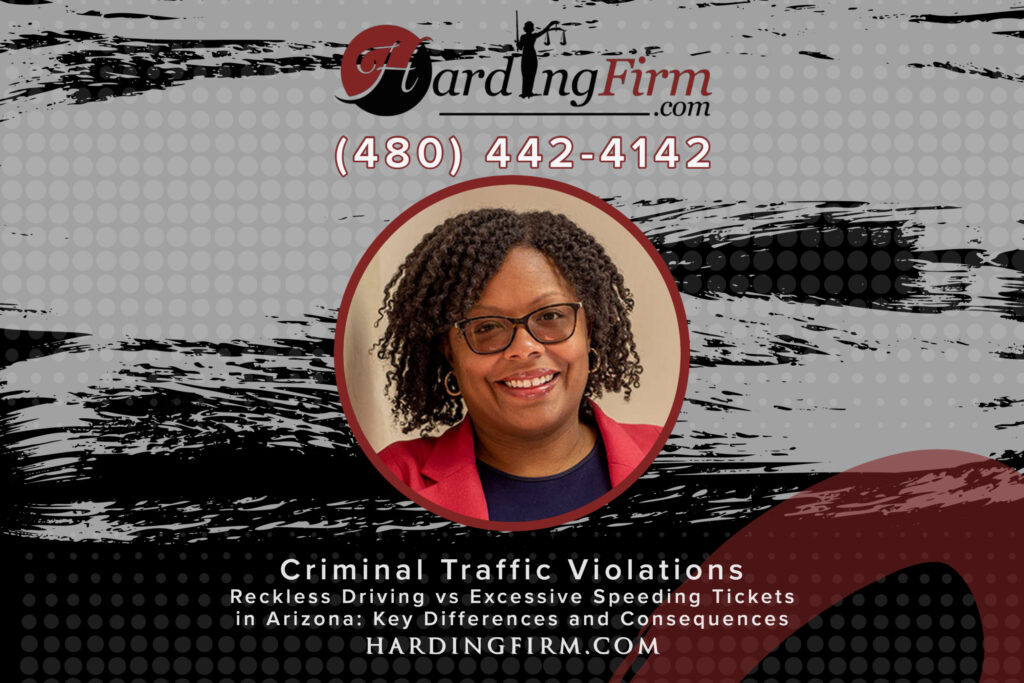Reckless Driving vs. Excessive Speeding Tickets in Arizona: Key Differences and Consequences
Reckless driving and excessive speeding are both serious traffic violations in Arizona, but they are distinct offenses with different legal definitions, penalties, and consequences. In this blog post, we will explore the differences between reckless driving and excessive speeding tickets in Arizona, as well as the potential consequences of each violation.
Reckless Driving in Arizona
Reckless driving is defined under Arizona Revised Statutes (ARS) § 28-693 as driving a vehicle with “a willful or wanton disregard for the safety of persons or property.” It involves a higher degree of carelessness or disregard for safety compared to other traffic violations.
Examples of reckless driving may include:
- Running red lights or stop signs at high speed
- Weaving in and out of traffic dangerously
- Driving at extremely high speeds in poor weather conditions
Reckless driving is a Class 2 misdemeanor in Arizona. Penalties for reckless driving can include:
- Up to 4 months in jail
- Fines of up to $750, plus additional surcharges
- Up to 5 points added to your driving record
- Possible license suspension or revocation
Excessive Speeding in Arizona
Excessive speeding, also known as criminal speeding, is defined under ARS § 28-701.02. It occurs when a driver exceeds the speed limit by a certain amount or drives at a speed deemed excessive under specific conditions. Excessive speeding is considered a criminal offense in Arizona and is distinct from civil speeding violations.
Excessive speeding in Arizona includes:
- Driving at a speed of 20 mph or more above the posted speed limit in a residential or business district
- Driving at a speed of 35 mph or more when approaching a school crossing
- Driving at a speed of 85 mph or more on any road or highway, regardless of the posted speed limit
Excessive speeding is a Class 3 misdemeanor in Arizona. Penalties for excessive speeding can include:
- Up to 30 days in jail
- Fines, which can be several hundred dollars or more
- 3 points added to your driving record
- Possible license suspension at the judge’s discretion
Key Differences and Consequences
While both reckless driving and excessive speeding are serious traffic offenses in Arizona, there are some key differences between the two:
- Severity of the Offense: Reckless driving is considered a more severe offense, as it involves a willful disregard for the safety of others, whereas excessive speeding is primarily focused on the speed of the vehicle.
- Criminal Charges: Both reckless driving and excessive speeding are criminal offenses in Arizona, but reckless driving is a Class 2 misdemeanor, while excessive speeding is a Class 3 misdemeanor. This means that the penalties for reckless driving are generally more severe than those for excessive speeding.
- Penalties: Reckless driving carries higher potential jail time, fines, and points on your driving record compared to excessive speeding. Additionally, reckless driving is more likely to result in license suspension or revocation.
Insurance Related Consequences for Reckless Driving and Excessive Speeding Citations
Reckless driving and excessive speeding can have a significant impact on your car insurance rates. Insurance companies consider reckless driving and excessive speeding as high-risk behaviors that could increase the likelihood of accidents, injuries, and property damage. As a result, insurance companies may deem you as a high-risk driver, which could result in higher insurance premiums or even a decline in coverage altogether.
Specifically, reckless driving or excessive speeding can affect your car insurance in the following ways:
- Increased premiums: Insurance companies are likely to raise your premiums after a reckless driving or excessive speeding conviction. The reason for the increase is that you are considered a higher risk driver. If you are considered high-risk, your insurance premiums may increase by 20-50%.
- Loss of discounts: Most insurance companies offer discounts to drivers who have a good driving record with no traffic violations or accidents. However, if you receive a reckless driving or excessive speeding ticket, your insurance company may revoke any discounts, further increasing your insurance premiums.
- Limited coverage options: If you have been convicted of reckless driving or excessive speeding, some insurance companies may refuse to renew your policy. Others may only provide limited coverage options that come with higher premiums and deductibles.
- Requirement of SR-22 insurance: If you have been convicted of reckless driving or excessive speeding, you may be required to file an SR-22 certificate with the state of Arizona. This is a document that your insurance company files on your behalf to confirm that you have purchased adequate liability coverage. An SR-22 certificate can be a costly requirement, and it is typically required for three years after a conviction for the offense.
Overall, reckless driving and excessive speeding not only carry serious legal consequences but can also have a long-lasting impact on your car insurance rates. To avoid these consequences, it’s crucial to obey traffic laws and drive responsibly.
Both reckless driving and excessive speeding tickets in Arizona carry serious consequences, and it’s essential to understand the differences between them. If you are facing either of these charges, it’s crucial to seek the assistance of an experienced traffic attorney who can help you navigate the legal process and potentially reduce the penalties you face. The Harding Firm specializes in helping clients with reckless driving, excessive speeding, and other traffic violation issues. Contact us today to discuss your case and learn how we can help you.


